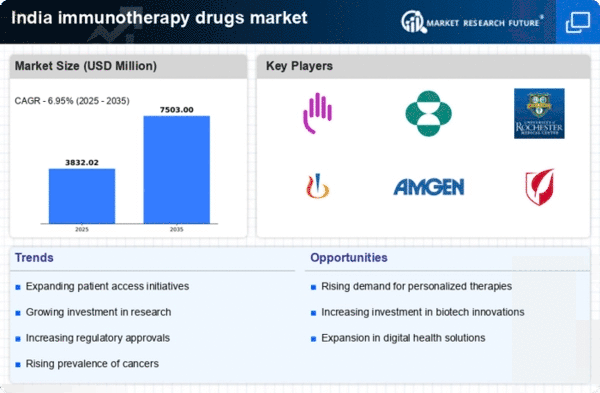Rising Awareness and Education
Rising awareness and education regarding cancer treatment options significantly influence the immunotherapy drugs market. As educational campaigns proliferate, patients and healthcare professionals become more informed about the benefits of immunotherapy. This increased awareness leads to a higher demand for these therapies, as patients actively seek out advanced treatment options. In India, the number of cancer awareness programs has surged, with various organizations promoting the understanding of immunotherapy's role in cancer care. This trend is expected to contribute to a projected market growth of 20% in the immunotherapy drugs market by 2026. Furthermore, as healthcare providers receive training on the latest immunotherapeutic techniques, the quality of care improves, fostering greater patient trust in these treatments. Thus, the rising awareness and education surrounding immunotherapy are likely to drive market expansion.
Increasing Healthcare Expenditure
The rising healthcare expenditure in India is a pivotal driver for the immunotherapy drugs market. As the government and private sectors allocate more funds towards healthcare, the accessibility of advanced treatments, including immunotherapy, improves. In 2025, healthcare spending in India is projected to reach approximately $370 billion, reflecting a growth rate of around 12% annually. This increase facilitates investments in research and development, leading to the introduction of innovative immunotherapy drugs. Furthermore, as healthcare infrastructure expands, more patients gain access to these therapies, potentially enhancing treatment outcomes. The growing awareness of cancer treatment options among the population also contributes to the demand for immunotherapy, indicating a shift towards personalized medicine. Thus, the increasing healthcare expenditure is likely to bolster the immunotherapy drugs market significantly.
Government Support and Policy Framework
Government support and a robust policy framework are essential drivers for the immunotherapy drugs market. The Indian government has initiated several policies aimed at enhancing cancer care, including subsidies for innovative treatments and tax incentives for pharmaceutical companies. These initiatives encourage research and development in immunotherapy, fostering a conducive environment for market growth. In 2025, the government is expected to allocate approximately $1 billion towards cancer research, which will likely benefit the immunotherapy sector. Additionally, regulatory bodies are streamlining approval processes for new immunotherapeutic agents, expediting their entry into the market. This supportive policy landscape not only boosts investor confidence but also ensures that patients have timely access to cutting-edge treatments. Consequently, government support is poised to play a vital role in the advancement of the immunotherapy drugs market.
Technological Advancements in Treatment
Technological advancements play a crucial role in shaping the immunotherapy drugs market. Innovations in biotechnology and genetic engineering have led to the development of more effective immunotherapeutic agents. For instance, the introduction of CAR-T cell therapy has revolutionized treatment protocols for certain cancers, demonstrating remarkable efficacy. In India, the market for immunotherapy drugs is expected to grow at a CAGR of 15% from 2025 to 2030, driven by these technological breakthroughs. Additionally, advancements in diagnostic tools enable earlier detection of cancers, allowing for timely immunotherapy interventions. The integration of artificial intelligence in drug development processes further accelerates the discovery of novel immunotherapeutic agents. Consequently, these technological advancements are likely to enhance the overall landscape of the immunotherapy drugs market, making treatments more accessible and effective.
Growing Incidence of Autoimmune Diseases
The growing incidence of autoimmune diseases is emerging as a significant driver for the immunotherapy drugs market. Conditions such as rheumatoid arthritis, lupus, and multiple sclerosis are increasingly prevalent in India, necessitating effective treatment options. Immunotherapy has shown promise in managing these diseases by modulating the immune response. The market for immunotherapy drugs is projected to expand as more patients seek these therapies, with an estimated growth rate of 10% annually. Furthermore, the rising burden of autoimmune diseases highlights the need for innovative treatment solutions, prompting pharmaceutical companies to invest in research and development. As awareness of immunotherapy's potential benefits in treating autoimmune conditions increases, the demand for these drugs is likely to rise, thereby contributing to the overall growth of the immunotherapy drugs market.
















